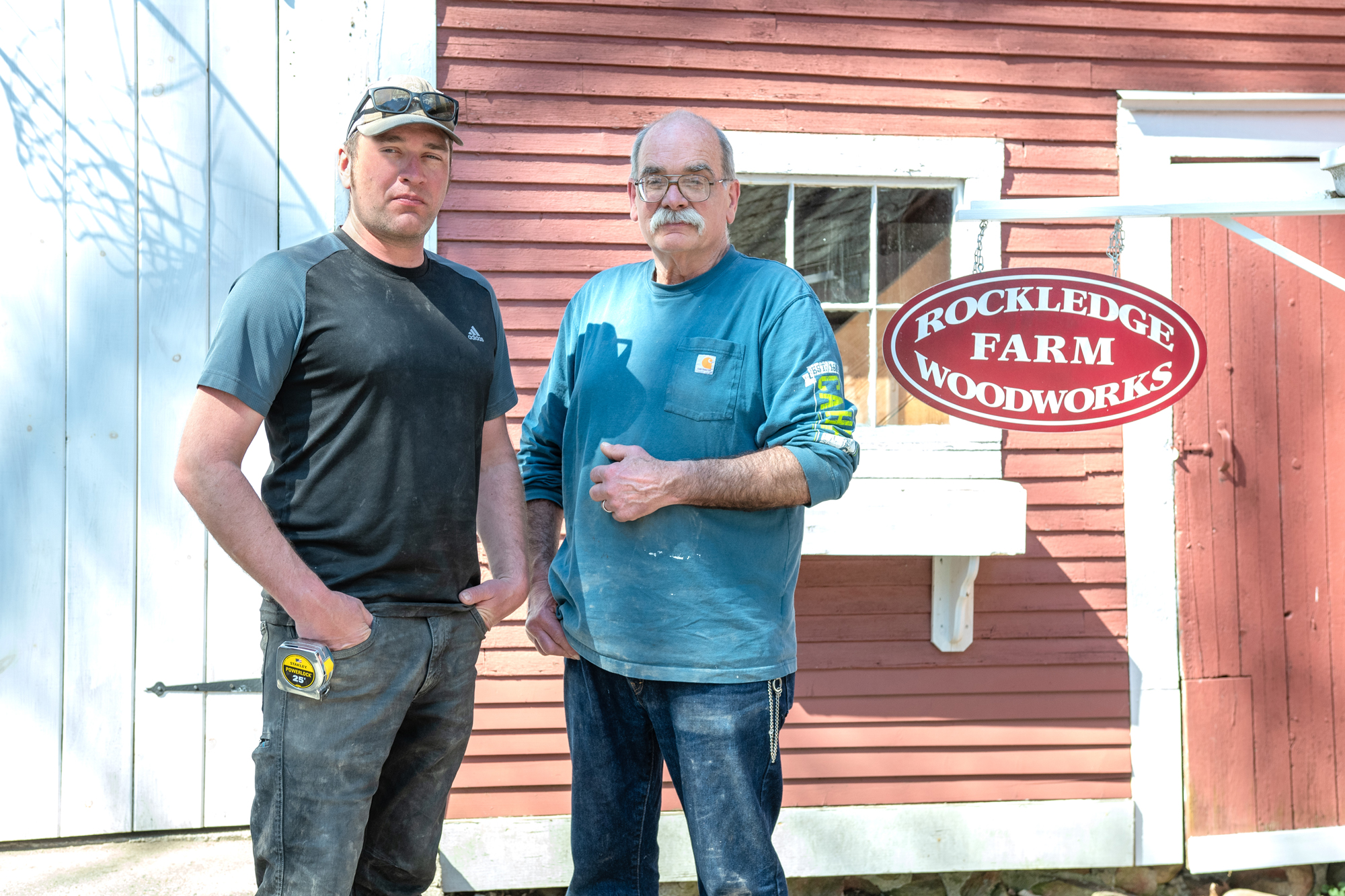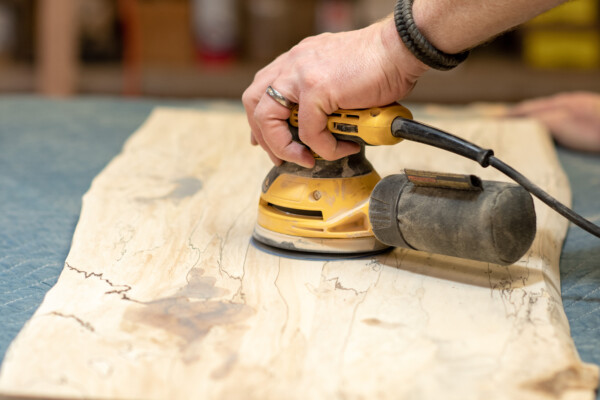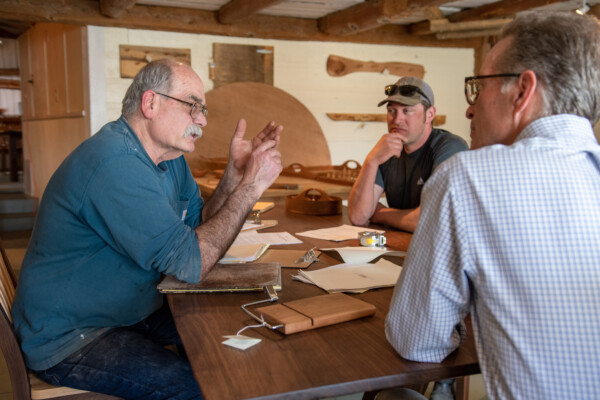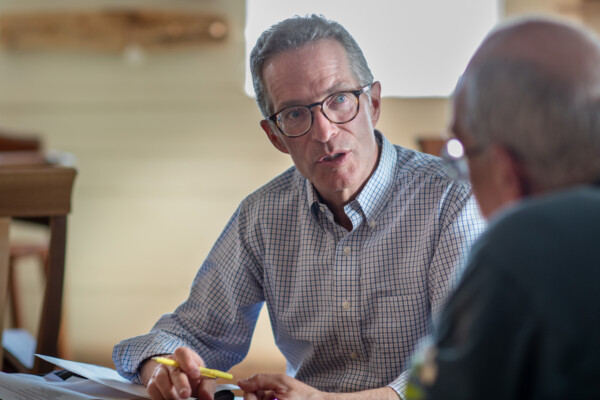A Father-Son Furniture Making Business Navigates Growth, Transition
October 07, 2024

Rockledge Farm plans for sustainable growth that is integrated with nature.
When Scott Duffy purchased his grandparent’s hilltop farm in Wethersfield, Vermont in 1987, his wife looked around the empty farmhouse and suggested that he “get busy building a dining room table” so the young family would have somewhere to eat.
A contractor at the time, Scott knew how to build homes and work with wood, but making furniture was new, and something that he found immediately satisfying. “It really did start that way,” he said. “I was completely self taught. I like seeing something tangible that I completed at the end of the day. There’s a sense of accomplishment that resonates with me.”
And he clearly has a knack for it. Not long after that dining room table was built for his family, friends and neighbors began asking if he could build a bench or table for their homes. Eventually, he decided to hang a shingle and opened Rockledge Farm Woodworks in 1994.

Rockledge Farm Woodworks is family-owned and operated, producing from native Vermont hardwoods and burls a wide range of handmade wood products. The company purchases wood from local lumber mills and estimates that 75 percent of the wood they use comes from the Northern Forest, primarily Vermont, New Hampshire, and Maine. Photo by Erica Houskeeper.
“It was a conscious decision to step into this commercially,” he said, “but it started very, very small. I guess the term now is organic growth.”
In those early years, Scott, sometimes accompanied by his young son, Ian, would travel to craft shows around New England to sell his pieces and drum up interest in custom work. “It was a good place to get a start,” he said, “and to get an idea of what customers might want. But it was a lot of work, a lot of time on the road.”
As word-of-mouth began to generate orders outside of the craft fair circuit, Scott decided to open a retail shop at the farm and let customers come to him. While there are a few pre-made pieces of furniture alongside the wooden kitchen utensils and games for sale, their sweet spot is working with customers to design heirloom, custom furniture. Scott and his son, Ian, who now works full time in the business, partner with customers to bring a piece to life. “People will come to us and say, ‘we want to lighten up a dark dining room,’ or ‘we want cherry side tables to match another piece in a room’,” said Ian. “They have a concept.”
“It’s a process we enjoy,” said Scott. “Working with that customer, helping them figure out what they’re looking for, walking them through how the piece will be made. It’s an experience for people. Most of our customers want something they have a hand in designing.”
Building a framework for growth.
Just as Scott and Ian settled into owning a small, but manageable and growing custom furniture-making business, the pandemic swept around the world. At first, everything came to a halt, but as weeks at home turned into months, and people turned their attention to their homes, the phone began to ring.
“We grew a lot faster than we were prepared for,” said Ian. “We had to hire people we didn’t expect to hire. It was growth, but it wasn’t sustained growth.” Scott had heard about the Vermont Sustainable Jobs Fund (VSJF) business coaching program and decided some outside advice could help them both navigate the unexpected surge–and prepare for its likely retreat.
“It was hard to get perspective,” said Ian. “Did we want to grow? If so, how much? Or did we like things the way they were? We were also starting to transition our roles in the business with Dad moving more to design and customer relations while I took on more shop operations, which was also a bit of a challenge.”
While their work with VSJF business coaches Steve Voigt and Carolyn Cooke is still underway, Scott says they’re helping him begin long-term planning.
“We’ve taken a good look at our business, our management tools, or lack thereof, and our processes,” he said. “We have more tools that we can engage to plan for intentional growth, rather than having it just happen.”
Part of that has been allowing Ian to take an active role in planning for the future. “We’re coming to a point where he’s taking on more responsibilities with the idea that I’ll have fewer, eventually,” said Scott.
“We’ve done the legwork, but Steve set up the framework for us, and gave us specific goals to work toward. So, because we do the legwork, it’s been a good learning process and one that has permanently informed and educated me on better business practices.”

Scott Duffy, left meets with VSJF business coach Steve Voigt and Ian Duffy. One of the things business coaches have helped with is long-term planning. Photo by Erica Houskeeper.
Healthy business, healthy forests.
Having experienced rapid growth, both Scott and Ian agree that moderate growth rooted in sustainable forestry is the goal for the future of Rockledge. “If we can sustain the people who are here, attract a handful of good employees, support a healthy forest economy, and continue to turn out heirloom quality furniture, then I’m happy,” said Ian.
Anecdotally, Scott says more and more customers care about where the wood comes from and how it’s harvested. “Buying local wood was part of the business from day one,” he said, “but people are paying more attention to where their possessions are coming from and how they’re made. That’s been a positive thing for us.”
Rockledge purchases wood from local lumber mills and estimates that 75 percent of the wood they use comes from the Northern Forest, primarily Vermont, New Hampshire, and Maine.
“As business people, as humans, if we use resources provided by nature, we have a responsibility to integrate into the ecosystem, not work in opposition to it,” said Ian. “When sustainable practices are used, forests flourish, nature flourishes, and our business is part of supporting that cycle.”
With those guardrails around growth and sustainability established, Scott and Ian are exploring ideas for the future. They are looking at new designs that might become the “nucleus” of a furniture line, including their popular Trestle Table. “It’s something we do on a regular basis,” said Scott. “There are always 4-5 custom orders in the queue for that table, so is there a way we can streamline that process and produce them more efficiently?”
“They have a high quality product that brings people to them,” said Steve, their VSJF coach. “By taking this time to work on the business, not just in it, they are moving general ideas around growth and transition onto a page with numbers so they can take the business to the next level.”

VSJF business coach Steve Voigt meets with Scott and Ian Duffy at Rockledge Farm in Reading. Photo by Erica Houskeeper.
About VSJF’s Business Management Coaching Program
The Vermont Sustainable Jobs Fund provides tailored, high-touch planning, coaching, and advising for business owners and their management teams to advance profitability, job creation, and sustainable job development. Click for more information about business management coaching. Funding support for our coaching program is provided by client fees, the SBA-Community Navigator Pilot Program, the Vermont Agency of Agriculture, Food and Markets, and Vermont Housing & Conservation Board’s Farm & Forest Viability Program.
Read More Stories Like This:
- Business Sense – complete FREE training series for entrepreneurs and small business owners now available
- Sawyer Made Balances Growth with Tradition
- At Trencher’s Farmhouse, Fresh Pasta Begins with Happy Chickens
- WheelPad Entrepreneur Julie Lineberger is Keeping Families Together
- A Farm, a Family, a Way of Life
- From Chocolate to Chili Peppers
- Junction Fiber Mill: Knitting a Business Together
- Creating a Regional Food System, One Warehouse at a Time
- The Roots Farm Market Brings a New Approach to the Old General Store
- Babette’s Table: Using Projections to Grow with Intention
- Bobolink Yarns: Scaling Back to Find Success
- Hemp and Cannabis Pioneer, Scott Sparks, Navigates Legalization in Vermont




